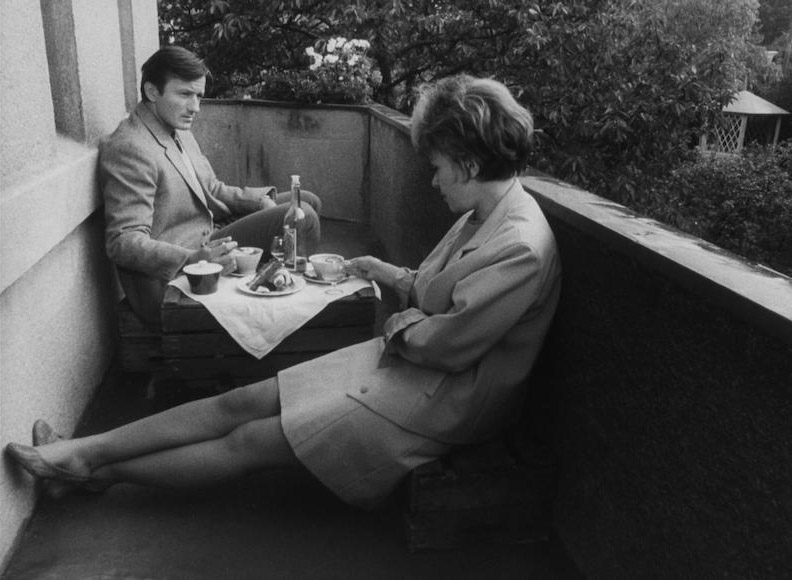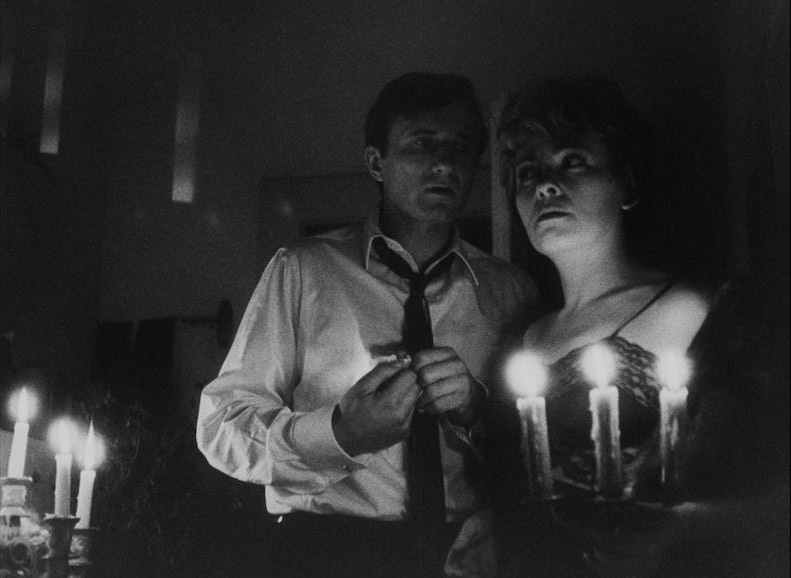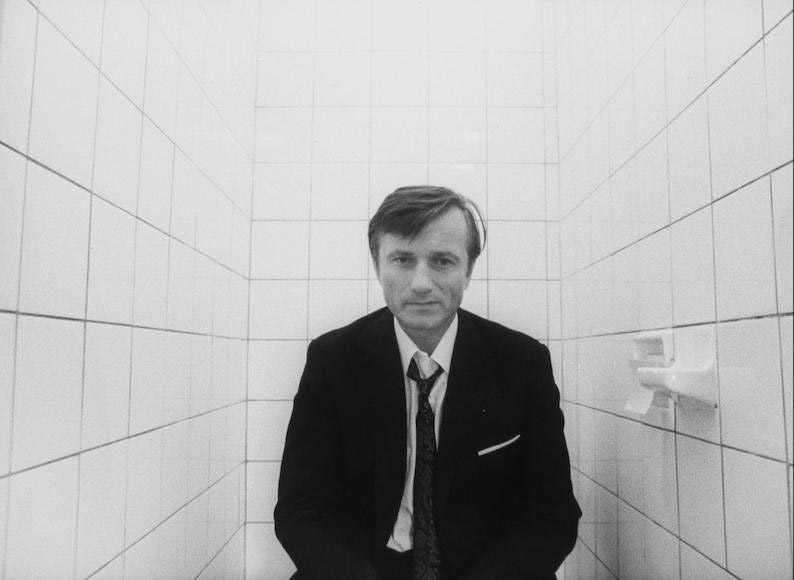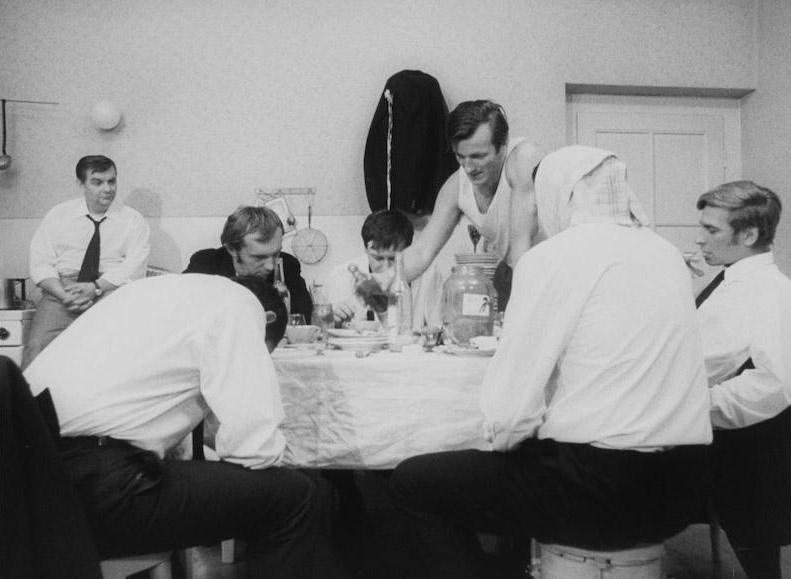|
Brimming with intense claustrophobia and noirlike dread, The Ear [Ucho] is a film where incredibly little actually happens and, aside from dreamlike flashbacks to a party, the setting consists entirely of an ordinary house nestled in a nondescript neighborhood. In many ways it is a domestic drama first and a politically-driven film second. The two main characters are a married couple bickering and worse on the night of their tenth wedding anniversary. They'd just been at a party where the man, a Communist official on the rise, went about his social duties seemingly without concern. It's only upon returning to their home, when we're introduced to the couple at the film's opening, that things go off course. The impatient missus wishes to urinate on the sidewalk outside their gate. As neither are able to locate keys to get into their own home, the man scolds his wife and points to a nearby, occupied vehicle parked a bit up the road. The paranoia begins.
An aside, perhaps, but after recently re-watching Alan J. Pakula's Klute – which came out just a year after The Ear – the always-intriguing notion of films about paranoia seems fresh. Surely Karel Kachyna's movie in which we're constantly reminded the government is listening to everything lands among the great entries, many of which just happened to emerge in the 1970s. (Pakula's The Parallax View and All the President's Men complete his paranoia trilogy and Coppola's The Conversation and Sydney Pollack's Three Days of the Condor still feel like essential starting points.) The notion of paranoia surely must have existed before this time period – indeed, Orwell's 1984 would have to a be a clear reference point as well –but the combination of increasing distrust in government plus a newfound excitement to stretch the boundaries of filmmaking allowed for ideas to be expressed which had rarely been seen on film.

Make no mistake, too, The Ear is explicit in its criticisms and intents. This is not a parable or a veiled swipe at the Communist government. Its slings and arrows are presented with palpable fear. The fate our protagonist is prepared to face when a group of drunken bureaucrats arrive at his home in the middle of the night is grim and matter-of-fact. He can't be sure just what would cause him to be sent to prison or eventual death yet he is prepared to go without a fight. Any sense of justice is removed from the equation here. That, in itself – how resigned he is – is horrifying. Unlike the many brilliant films of the Czech New Wave which sharply criticized the Communist regime of the time through subversion, The Ear presents a more or less contemporary Czech government (clues suggest the official setting is the late 1950s) surveilling its citizens, its bureaucrats and potentially imprisoning them for little reason beyond a whiff of disloyalty and all absent any real due process. It's amazing this film was ever made and entirely unsurprising it was banned until the Velvet Revolution of 1989.
Aside from the sexier angle of The Ear, which takes its title from what the main characters call the somewhat undefined, Big Brother-like entity they believe to be listening to their conversations, the dynamic between a husband and wife now married a decade colors much of the film. Ludvik (Radoslav Brzobohaty) and Anna (Jirina Bohdalova) have an unseen child and a metric ton of baggage. Anna seems to constantly bicker, to the point of apparent annoyance until the shadows clear away a little and the audience is allowed to shift perspectives. What might at once seem like a somewhat stereotypical nagging wife transforms into a much deeper, more nuanced character – reminiscent of, if not necessarily parallel to, Who's Afraid of Virginia Woolf? but with only the fleeting intensity of Taylor and Burton. Still, there's one sequence in the film involving physical violence to the point of abuse that is downright uncomfortable to watch but bravely intact for viewing. By the film's final turn we've see a more rounded portrait of the marriage rather than mere sniping and shouting. The flickers of support don't negate the abuse but the complicated nature of the relationship now seems fully realized.

Adding to the disorientation is the lighting and cinematography, done by Josef Illik, who's also credited with Witchhammer in the same year. Because Ludvik and Anna return to a lack of electricity the lighting takes on a haunted house feeling, complete with a reliance on candles as they walk through the home. The murkiness defines the mood. Whereas the earlier Second Run DVD release used on an older transfer that tended to hide the effectiveness of the lighting, this remastering allows the viewer to revel a bit in the shadows. It's an improved experience without a doubt. All of the stress and tension that plays out between the couple is accentuated by the visual disorientation. That furthers the strangeness of the first-person flashbacks to the party, with its bright and loud contrast.
Director Karel Kachyňa isn't easy to pigeonhole amongst his Czech New Wave peers. The Ear seems like a clear product of this movement. It ticks all the boxes and simply feels of the same mindset as so many of the challenging and bold movies from the period. Nonetheless, Kachyňa's other films, at least from their descriptions, seem different. There are several politically-oriented ones he made alongside his frequent collaborator and co-writer Jan Prochazka prior to The Ear. Among his earlier works, Coach to Vienna (1966) is well-regarded but it doesn't quite sound as caustic as what we see with The Ear. The period after this film, with its swift banning and Prochazka's premature death in 1971, found Kachyňa turning to children's films. Later in his career he dusted off a Prochazka screenplay and made The Cow. Nothing, however, quite sounds like a companion or continuation of what we see in The Ear.
Second Run brings The Ear to region-free Blu-ray nearly fourteen years after it was among the label's earliest DVD release. That edition, while far from perfect, was a great way to introduce the film to those otherwise unfamiliar with a key entry in the Czech New Wave. The original DVD transfer was VHS-level, if still watchable. This new Blu-ray version, in the 1.37:1 aspect ratio, is a marked improvement. It's advertised as deriving "from a new HD re-master and transfer from original materials by the Czech National Film Archive." Imperfections still exist and this doesn't have quite the same crispness or pristine quality as some of the recently released Second Run editions where new 4k restorations were the source. Bits of damage and dirt in the frame do still exist, with the opening titles alerting the viewer right away that this isn't sourced from a full-scale clean-up. It's almost amazing to even notice such a disparity and testament to the rather spoiled expectations Second Run has now established. Overall, though, it's pleasing beyond reasonable critique.

Audio is a similar situation, as this Blu-ray improves handily over the DVD edition. The Czech 2.0 Dual Mono LPCM track offers no hesitations. English subtitles are optional.
A short film The Uninvited Guest (22:56), directed by Vlastimil Venclik as a third-year FAMU student and with Karel Kachyna's name as an advisor, is included on the disc. It's easy to see why the short was banned by the State authorities. A married couple in bed for the night are interrupted by a banging at their apartment door. A large man in a hat and carrying a case comes right in like he belongs. The couple is shocked, and the husband goes to his neighbors on the floor only to discover they too have men dressed in similar outfits now co-habitating. So, particularly in the context of the feature on this disc, rather than simply have listening devices for the government to monitor inside one's home this short takes the idea to absurdist lengths by having a live-in surveillant making regular reports. The tone of the short is almost sweet and easygoing but it's a chilling concept on ideas of privacy and authoritarianism. Highly recommended.
The Commentary Track included here is from the Projection Booth podcast and features Mike White, Ben Buckingham and Martin Kessler. They just speak of the film somewhat generally rather than in a scene specific manner. It feels more like a causal roundtable of reactions than the kind of commentary track we might find elsewhere. Still worth a listen if you finish watching the movie and crave a bit of additional discussion.

A filmed Introduction by Peter Hames (13:03) is carried over from the 2005 DVD release and remains a sterling companion to the film.
The included Booklet runs 20 pages and begins with Hames' 3+ pages focusing on director Karel Kachyna. It's followed by an appreciation of the film by Steven Jay Schneider running 4 pages and a more detailed analysis by Graham Williamson for 4 additional pages. There's also an interesting page showing an opening declaration apparently intended to accompany prints of the film at the behest of either producers or the Czech censors, where it's spelled out in black and white that the story is fictitious and fantasy, etc. Sure.
Few things get us up in arms like breaches of privacy. As that ideal becomes increasingly narrowed, it's important to catch up to films like The Ear, in part because it can be helpful to find some historical context. The runaway train that is technology births extra surveillance in the pandora's box of side effects. The Ear puts it on film, fifty years previous, and it does so with the added ingredient of domestic drama by depicting a decaying marriage on the night of its tenth anniversary. Offering up a fine presentation, complete with salient extra features such as a possibly even more caustic short film, is Second Run's Blu-ray revisiting of a title once released in an okay edition on DVD and now upgraded significantly.
|